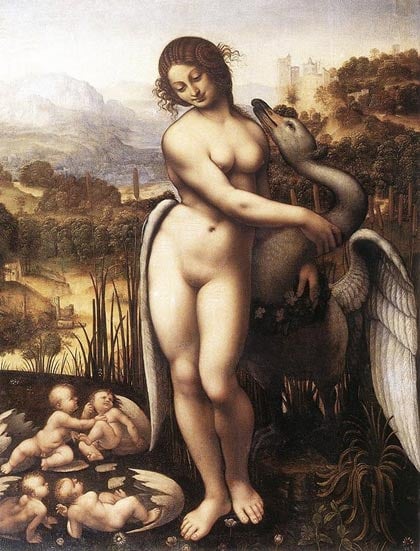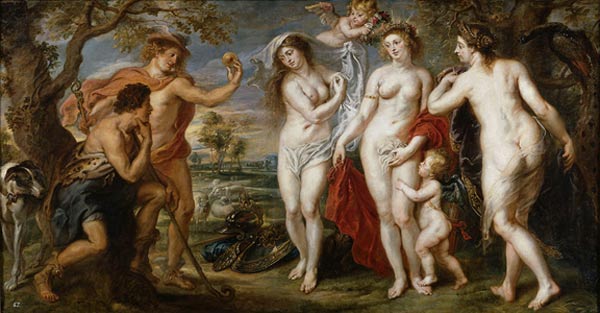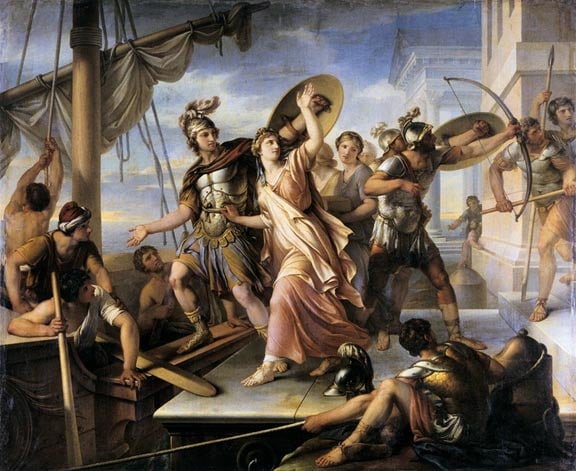Helen of Troy, The Beauty Who Sparked the Trojan War
In Greek mythology, Helen of Troy is known as the woman whose beauty sparked the Trojan War. But Helen’s character is more complex than it seems. When considering the many Greek and Roman myths that surround Helen, from her childhood to her life after the Trojan War, a layered and fascinating woman emerges.
Helen is among the mythical characters fathered by Zeus. In the form of a swan, Zeus either seduced or assaulted Helen’s mother Leda. On the same night, Leda slept with her husband Tyndareus and as a result gave birth to four children, who hatched from two eggs.

“Leda and the Swan” by Cesare da Sesto, copy of lost painting by Leonardo da Vinci (1515-1520). Image source.
From one egg came the semi-divine children, Helen and Polydeuces (who is called Pollux in Latin), and from the other egg came the mortals Clytemnestra and Castor. The boys, collectively called the Dioscuri, became the divine protectors of sailors at sea, while Helen and Clytemnestra would go on to play important roles in the saga of the Trojan War.
In another, older myth, Helen’s parents were Zeus and Nemesis, the goddess of vengeance. In this version, too, Helen hatched from an egg.
Helen was destined to be the most beautiful woman in the world. Her reputation was so great that even as a young child, the hero Theseus desired her for his bride. He kidnapped her and hid her in his city of Athens, but when he was away, Helen’s brothers, the Dioscuri, rescued her and brought her home.
As an adult, Helen was courted by many suitors, out of whom she chose Menelaus, the king of Sparta. But though Menelaus was valiant and wealthy, Helen’s love for him would prove tenuous.
Around this time there was a great event among the Olympians: the marriage of the goddess Thetis to the mortal Peleus. All the gods were invited to attend except for Eris, whose name means “discord.” Furious at her exclusion, Eris comes to the party anyway and tosses an apple to the goddesses Hera, Athena, and Aphrodite on which is written “for the most beautiful.” Each goddess claims the apple is meant for her and the ensuing dispute threatens the peace of Olympus.
Zeus appoints the Trojan prince Paris to judge who is most beautiful of the three. To sway his vote, each goddess offers Paris a bribe. From Hera, Paris would have royal power, while Athena offers victory in battle. Aphrodite promises him Helen, the most beautiful woman in the world as his wife, and Paris names her winner of the competition.

“The Judgment of Paris” by Peter Paul Reubens (ca. 1638). Paris contemplates the goddesses while Hermes holds up the apple. Athena is nearest to Hermes with her characteristic weapons by her side, Aphrodite is in the middle with her son Eros hugging her leg, and Hera stands on the far right. Image source.
To claim the prize promised by Aphrodite, Paris travels to the court of Menelaus, where he is honored as guest. Defying the ancient laws of hospitality, Paris seduces Helen and flees with her in his ship.
Roman poet Ovid writes a letter from Helen to Paris, capturing her mix of hesitance and eagerness:
I wish you had come in your swift ship back then,
When my virginity was sought by a thousand suitors.
If I had seen you, you would have been first of the thousand,
My husband will give me pardon for this judgment!
(Ovid, Heroides 17.103-6)

“The Abduction of Helen” by Gavin Hamilton (1784). Image source.
Paris sails home to Troy with his new bride, an act which was considered abduction regardless of Helen’s complicity. When Menelaus discovers that Helen is gone, he and his brother Agamemnon lead troops overseas to wage war on Troy.
There is, however, another version of Helen’s journey from Mycenae put forth by the historian Herodotus, the poet Stesichorus, and the playwright Euripides in his play Helen. In this version, a storm forces Paris and Helen to land in Egypt, where the local king removes Helen from her kidnapper and sends Paris back to Troy. In Egypt, Helen is worshipped as the “Foreign Aphrodite.” Meanwhile, at Troy, a phantom image of Helen convinces the Greeks she is there. Eventually, the Greeks win the war and Menelaus arrives in Egypt to reunite with the real Helen and sail home. Herodotus argues that this version of the story is more plausible because if the Trojans had had the real Helen in their city, they would have given her back rather than let so many great soldiers die in battle over her.
Nevertheless, in the most popular version of the story, that of Homer, Helen and Paris return to Troy together. When they arrive, Paris’ first wife, the nymph Oenone, sees them together and laments that he has abandoned her. She grows bitter and even faults Helen for having been kidnapped by Theseus as a child. In heartbroken anger she says:
She who is abducted so often, must offer herself up to be abducted!
(Ovid, Heroides V.132)
Paris’ slight against Oenone would prove detrimental for him in the end.
The Greeks sail to Troy and ten years of war commence.
Featured image: Helen of Troy (nikola-master / Adobe Stock)
Coming Next in Part Two: Helen and the Final Battle in Troy
Primary Sources
Euripides Helen; Trojan Women; Orestes
Herodotus, The Histories
Homer, Iliad; Odyssey
Hyginus, Fabulae
Lucian, Judgment of Paris
Ovid, Heroides V, XVI, XVII
Stesichorus, Palinode
Vergil, Aeneid




















Comments
The abduction of Helen could be the excuse for the ten year war of Greeks against Troy, but the root cause could not be other that the control of Dardanelles straits. Troy, at the entrance of Dardanelles controlled the passage to the Black sea where the rich deposits of gold, silver and iron were reached and traded. It was hardly a coincidence that some of the Greek heros (Achilles, Odysseus, Ajax) of the Trojan war were sons of Argonauts, who were seeking gold in the east coast of Black sea one generation earlier. Anyway, Homer mentioned that a Greek delegation (Menelaus and Odysseus) visited Troy before the climax of the war to negotiate the return of Helen and the treasures of Menelaus (Iliad book 3, 205-220), but they returned empty handed. Sure enough there were many “sequels”, “prequels” and dramas (tragedies) around the Trojan war both in classic Greek and Roman era, but they all were trying to extrapolate and share a part of the glory of the original Homer’s story.
I had never heard of Helen going to Egypt. That's wild.
Peace and Love,
Ricky.
and none of this story makes any sense unless you have the key.
"Alice in wonderland" makes no sense unless one understands that Lewis Carrroll was experimenting with Amanita Muscaria, the European version of a magic mushroom.
Helen of Troy has a different key and the key is in the names of the players in the story.